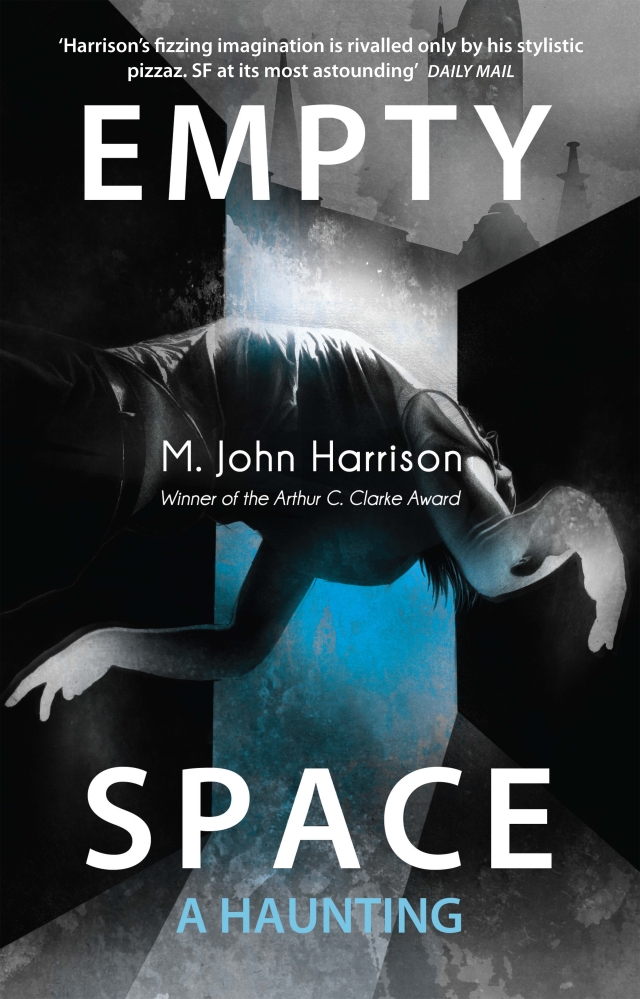On a long-haul flight, I read M. John Harrison’s Empty Space: A Haunting, the final part of his startling Kefahuci Tract trilogy. I found it compelling, bewildering, funny and shot through with an ennui of the uncategorisable. This is an immediate, pre-rationalisation, attempt to explain why.
For those not familiar with his work, Harrison is a ‘writer’s writer’ who has long-inhabited a fuzzy post-genre territory. Liminal is a word often used. Transitional, cross-border ideas. Given Empty Space: A Haunting includes space opera, pseudo-noir, occultism and near-as-dammit-future-as-to-be-today fiction, you can see why. To take it further, Harrison is interested in lacunas, singularities and our relationship with the incomprehensible. Like VanderMeer’s Area X and the zone of Roadside Picnic/Stalker, this is one of the defining characteristics of the Kefahuchi Tract.
This capstone to a trilogy serves to unite the narrative strands woven in Light and Nova Swing, but my feeling is the narrative is just one aspect of what’s important with Harrison. I could tell you the key events, and you wouldn’t receive any particular wisdom about these books. In fact, it would probably mislead. Matthew Cheney’s review for Strange Horizons explains why that is:
Character lists and plot summaries do no good because the story of these characters is a series of patterns (of differences and repetitions) that, in terms of plot, do not function through traditional causality; and, in terms of character, do not function in terms of traditional psychology. We can cluster words of the text into concepts of character, plot, and setting without any trouble—but these concepts don’t do much within our habitualized logic of narrative sense […] Most of what happens and where it happens is comprehensible on its own surface terms, related in regular English words. But unlike puzzle pieces or falling dominoes, the events of Empty Space don’t knock one by one into the next; instead, they flow like falling rain or the code that scrolls down the assistant’s arm.
What is so striking, instead, is the rich allusive web of the books. In the far-future sequences, where the Tract has fallen onto the planets of the beach, meaning is both ubiquitous and out of reach. Commoditised nostalgia lets the Assistant live like a 1950s housewife (complete with misogyny and inadequate dominant males), people choose which era Marilyn Monroe they want to be and much, much more. And yet ghosts walk among them, adverts live to literally pursue their demographic, viral code infects people and alien artefacts periodically wander out of the Tract and try to pass themselves off as human.
As with Ulysses, you could track every allusion Harrison makes if you wanted – something Cheney nods to. It would take years, and no doubt prove fascinating, but wouldn’t give you the shape of the book. Instead, you’d end up with a mysterious symbol, an occult ritual of post-its, pins and hyperlinks, and perhaps a sense of earned value embracing a profound loss Harrison would appreciate, given wit like this:
Renoko felt that kitsch was a product of an event he named ‘the postmodern ironisation’, prior to which it could not exist: before that, the objects you could now describe as kitsch were actually trash objects. ‘Without the operation of irony on trash,’ he maintained, ‘there would be no kitsch.’ To him, the postmodern ironisation was like the Death of History or the coming Singularity. ‘Everything was changed by it. Nothing could be the same again. It had the irreversibly transformational qualities of a Rapture.’
But what about this empty space? Throughout the book, space is reeling with stuff. The infinite void teems with data, bizarre physics, dust and sensory experience. Everything is soaked in synaesthesia, so you taste and touch and smell the hyper-reality of eleven-dimensional space. It is slick, viscous and rich. The physical realities presented are overwhelming. The empty space is all within, in the dissonance of our comprehension even as we define things by what we don’t know about them. To quote:
In addition, physical limitations seemed to apply. The past was clear enough to see, but you get as if you were engaging with it from to far away. Sometimes speech failed completely, and Anna could make herself known only in other ways, via the weather, for instance, or showers of emotionally-charged objects. It was as if the universe she now inhabited had suffered brain damage, and was experiencing a confusion not between different senses but between different states of energy and matter. She was reduced to a kind of practical synaesthesia. She was reduced to the use of theatre, metaphor, symbols and emotions. She tried everything, but remained an epiphenomenon of her own life, a figure distantly semaphoring tragic news from a hill.
We are Liv and Antoyne, retreating from the cargo hold which contains alien artefacts and what’s left of Ed Chianese, after he returns from the Tract. We are the Assistant, pursuing herself, never able to communicate across the breach. We are Anna, finally escaping the legacy of her serial killer husband, Michael Kearney, by becoming the singularity that is the Aleph. Same as the Assistant, she finds harmony in the simultaneous acts of self-destruction and becoming.
Amidst this swirl of lost people, incapable of defining themselves, awash in this excess of stuff, I found solace in the objects. There are moments of consistency, stable points to latch on to. You see it when objects are experienced the same way by different people. Even when they are bizarre, like a vulva protruding from a wall, there is a security to be had knowing that thing will always be seen in a particular way.
That consistency of description becomes our Rosetta Stone. Harrison is a liminal writer, interested in our relationship with the unknowable. The empty space is within us; we know where the ghosts live.




